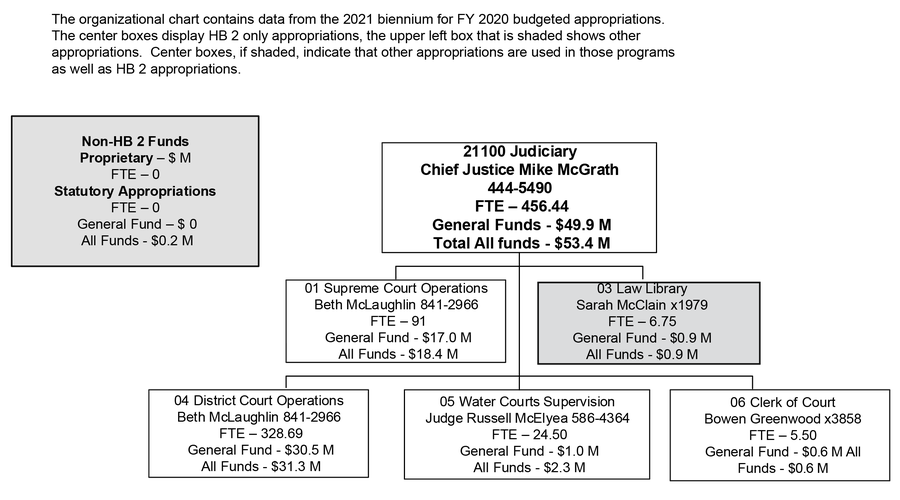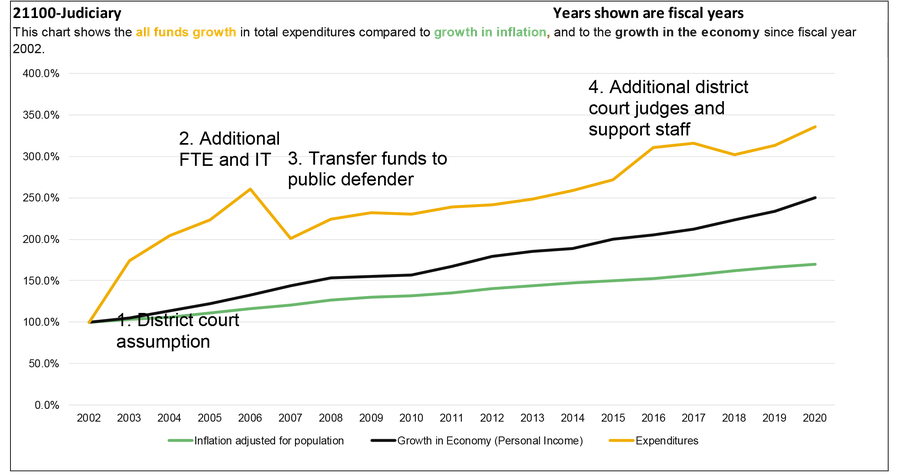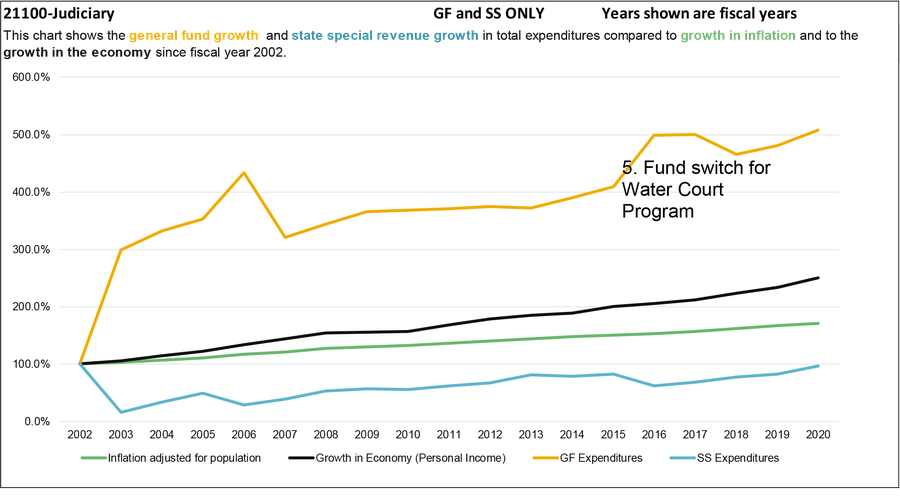Montana State Legislature
Judicial Branch
The Judicial Branch's mission is to provide an independent, accessible, responsive, impartial and timely forum to resolve disputes; to preserve the rule of law; and to protect the rights and liberties guaranteed by the Constitutions of the United States and Montana.
The Judicial Branch provides services through the following courts and supporting functions. The Montana Supreme Court is a court of review and a court of original jurisdiction. The court has jurisdiction over appeals from all Montana district courts. This court also hears appeals from the Water and the Workers’ Compensation Courts. It has original jurisdiction to hear and determine writs, attorney discipline, rules governing appellate procedure, and practice and procedures for the other courts. It also has supervisory control of all state courts and the entire judicial system. Under this court is the Court Administrator who is the appointed administrative officer of the Supreme Court, administrative services, court services, and information technology development and support. The court uses boards and commissions to assist it in matters involving rulemaking and oversight of Judicial Branch functions in Montana. Among the boards and commissions within the branch are the: Sentence Review Board, Commission on Practice, Commission on Courts of Limited Jurisdiction, Judicial Standards Commission, and the Judicial Nomination Commission. The Clerk of the Supreme Court, an elected official, conducts the business of the Supreme Court, including controlling the dockets and filings, managing appellate mediations, maintaining the official roll of Montana attorneys, and licensing for the attorneys.
District courts are courts of general jurisdiction that process felony cases, probate cases, civil cases and actions, special actions and proceedings, naturalization proceedings, writs, and ballot issues and have some appellate jurisdiction of cases from courts of limited jurisdiction. Included in district courts is a function for overseeing probation of juveniles. Except for clerks of court or other elected county officials, operations of district courts including judges are funded by the state.
The Water Court adjudicates state law-based water rights and federal and Indian water right claims. The State Law Library, governed by the board of trustees composed of the seven members of the Supreme Court, provides resource information to the public and those working within the court system.


This report includes a series of charts that compare expenditure growth to the growth in the economy and growth in inflation adjusted for population. Montana statute, 17-8-106, MCA, recommends using growth in personal income for comparison purposes. Personal income is a measure for growth in the economy. Comparing growth allows financial planners to consider past and future demands in services or changes in revenues.
The following list discusses the inflection points in the charts in more detail:
- The Judicial Branch saw an increase in expenditures in FY 2003 due to SB 176, which required state assumption of administrative responsibilities of the district courts. Approximately 265.00 FTE became new state employees, and the state assumed the cost of district court staff including secretaries, court reporters, juvenile probation officers, special masters to the judges, and law clerks at their current salaries and benefits. SB 176 also transferred financial responsibility for public defender costs associated with the district courts.
- In FY 2005, the district court assumption budget was established as a $37.3 million biennial appropriation, including 245.18 FTE. HB 18 also added 14.00 FTE and $3.6 million for IT costs, which were previously in the budget, but covered by a court surcharge.
- The decrease in expenditures in FY 2007 included the transfer of all the Judiciary’s public defender functions, costs totaling $8.1 million and 1.50 FTE, to the statewide Public Defender Office.
- Expenditures steadily increased over the next several years, with an increase in FY 2016 and FY 2017 due to: moving juvenile delinquency intervention program (JDIP) funds including 4.00 FTE from the Department of Corrections (HB 233), 3.00 FTE information technology positions, 5.00 FTE to support the court help program, 3.5 FTE for district courts, and elected official pay increases. The legislature also funded 13.00 FTE in supreme court operations, including 3.00 FTE new district court judges and the 8.00 FTE staff associated with the new judges.

- In FY 2016 and FY 2017, general fund increases include a funding switch from state special revenue to general fund of $1.1 million for the water court program, an increase in state special revenue from fees assessed to treatment court participants, and funding for court appointed special advocates.
General fund
The general fund increased in FY 2003 due to the state assumption of administrative responsibilities of the district courts. The decrease in operating expenses starting in FY 2007 were related to the transfer of district court public defender costs to the newly created Office of Public Defender. In FY 2016- FY 2017, general fund increased by $19.7 million, including the addition of three new district court judges and associated support staff.
State Special Revenue
State special revenue growth remained fairly constant during this time with the exception of a decrease in FY 2016 due to a fund switch of $1.1 million for the water court program.
Legislative Changes
The following legislative changes adopted by the 2019 Legislature include:
- HB 3 - This bill appropriated $120,000 of general fund to Supreme Court Operations for fiscal year 2019.
- SB 26 - This bill eliminates the Judicial Branch's responsibility to pay witness fees and expenses in criminal proceedings when subpoenaed on behalf of the attorney general or a county attorney and provides that the attorney general reimburses the counties up to the current appropriation level. Witness expenses include travel costs, such as airfare, mileage, lodging, and meals.
- HB 654 - The bill creates a licensing requirement for first time sales of opioids in the State of Montana. The revenue will be deposited into a state special revenue account to be used to support existing drug treatment courts in Montana. HB 654 also includes a one-time transfer of $2.0 million from the consumer protection account to the treatment court support account. HB 654 limits the Judicial Branch spending to $250,000 a year starting in FY 2021
The following legislative changes adopted by the 2017 Legislature include: The 2017 Legislature passed a package of bills recommended by the Commission on Sentencing. Those that impacted the Judicial Branch include:
- SB 59 – requires the Judicial Branch to establish a pre-trial risk assessment tool and a deferred prosecution grant program
- SB 63 – revises the process to revoke or terminate a deferred or suspended
- HB 133 – revises sentencing laws Additional legislation passed by the 2017 Legislature impacting the Judicial Branch include:
- HB 44 – increased the number of judges by one in the 4th and two in the 13th districts. Funding for the additional judges was provided in HB 2
- HB 70 – created a working interdisciplinary network of guardianship stakeholders (WINGS) and related grant program to provide ongoing evaluation of laws, services and practices related to adult guardianship and conservatorship (note in FY 2018 special session reductions delayed the program until FY 2019)
The 2015 Legislature adopted HB 233 which transferred administration of juvenile placement funds to the Judicial Branch from the Department of Corrections.
The 2013 Legislature passed HB 107 which assigned funding responsibility for court appointed counsel.
The 2011 Legislature added an associate water judge to the water court in HB 587.
The 2009 Legislature added three district court judges, in the 1st, 11th, and 13th districts, in SB 158.
The 2007 Legislature:
- Revised the Juvenile Delinquency Intervention Act and the Department of Corrections and the Judicial Branch in SB 146
- Established an Accelerated Water Adjudication Program in HB 473 and $25.0 million general fund was transferred to the water adjudication state special revenue account to fund the program through FY 2020
- Appropriated Long-range Information Technology Program funding in HB 4 of the May 2007 Special Session for case management and courtroom technology improvements
Click the double-sided arrow in the lower right corner of the image below to enlarge the graphic. Then, click the box next to the agency you want to see. To minimize, click Esc.
Legislative Studies
Law & Justice Interim Committee work
Audit Reports
Financial Compliance Audit - Judicial Branch - April 2019
Montana Chiropractic Legal Panel Audited Financial Statements June 30, 2018 & 2017
Montana Medical Legal Panel Audited Financial Statements - Dec. 31, 2018 & 2017
Legislation
HB 91 Revise violent offender registry laws
HB 102 Revise gun laws
HB 105 Revise unlawful transactions with children laws
HB 109 Provide for enforcement of seatbelt laws
HB 110 Revising laws related to obstruction of a peace officer or public servant
HB 112 and amendments Require interscholastic athletes to participate under sex assigned at birth
HB 113 Provide for youth health protection
HB 114 Privacy in communication exception laws
HB 115 Increase penalties for 5th and subsequent DUI
HB 116 Indoor cleanup standards for methamphetamine
HB 126 Revise laws concerning conduct of persons with alcoholism and drug addiction
HB 136 Establish pain-capable unborn child protection act
HB 140 Requiring provision of information before the performance of an abortion
HB 141 Revising vehicle and vessel title transfer laws
HB 144 Revise laws for preserving authority of sheriffs, constables and peace officers
HB 164, Revise temporary automatic domestic relations orders
HB 167, Referendum to adopt the Montana Born-Alive Infant Protection Act
HB 171, Adopt the Montana Abortion Inducing Drug Risk Protocol Act
HB 189, Revise criminal sentencing and judgement laws
HB 200, Prohibiting sanctuary cities in Montana
HB 209, Generally revise family laws relating to children and parents
HB 211, Provide compensation and assistance for secondary victims
HB 215, Revise definition of permissible fireworks
HB 244, Revise death penalty laws related to lethal injection
HB 256, Revise child restraint laws
HB 258, Revise laws related to firearms, ammunition, and accessories
HB 310, Revise sexual assault reporting laws
HB 313, revise medical examiner/coroner laws
HB 317, Revise state employee laws related to travel expenses
HB 325, Elect supreme court justices by districts
SB 4 and fiscal note Extend Missing Indigenous Persons Task Force
SB 9 Motorcycle filtering
SB 31 Require consideration of less restrictive options in guardianship proceedings
SB 32 Revise monitoring requirements of guardians of adults
SB 39 and fiscal note Revise laws related to sexual offender evaluations and treatment
SB 49 and fiscal note Generally revise gambling laws
SB 62, Revise unlawful possession laws
SB 64, Revise compliance with federal REAL ID Act
SB 67, Revise laws pertaining to law enforcement
SB 69, Revise settlement laws
SB 71, Remove penalties for law enforcement re: health officer assistance
SB 79, Revise laws regarding vehicle salvage certificates and certificates of title
SB 81, Include prepaid wireless in 9-1-1 tax
SB 83, Revise special lien laws
SB 104, Uniform Family Law Arbitration Act
SB 127, Revise laws on the selection of municipal court judges
SB 140, Revise laws relating to the judiciary
SB 141, Prohibition on alteration of law by state court
SB 151, Eliminate religious exemption regarding reporting sexual abuse
HB 277, Provide for a state government performance and results act (impacts LFC)
Jan. 7 Budget
Nov. 15 Budget
Agency profile information provided by the Legislative Fiscal Division.
